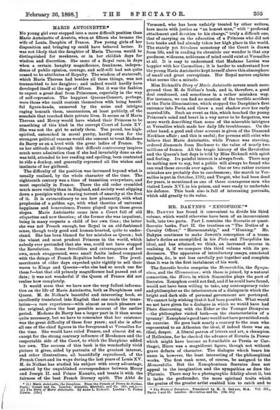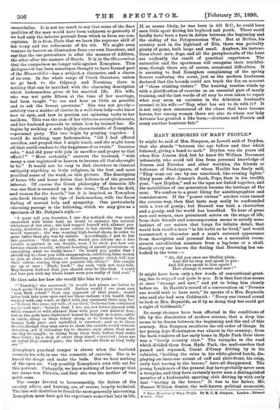MR. DAKYNS'S " XENOPHON."•
MR. DAKYNS has found it convenient to divide his third volume, which would otherwise have been of an inconvenient bulk, into two parts. Part I. contains the Socratic or quasi- Socratic books, Part IL the treatises on " The Duties of a Cavalry Officer," Horsemanship," and "Hunting." Mr. Dakyns continues to make Jowett's conception of a trans- lator's duties as exemplified in his Plato and Thucydides hie idea), and has attained, we think, an increased success in realising it, if we compare this third volume with its pre- decessors. The apparatus of introductory essays, annotated analysis, &c., is not less carefully put together and complete than it was in the first instalment of his work.
The Socratic books comprise the Memorabilia, the Sympo- sium, and the (Economicus ; with these is joined, by a natural connection, the Hiero, in which Simonides plays the part of Socrates. Xenophon could not find, and if he could have found, would not have been willing to take, any contemporary ruler and philosopher as the interlocutors of a dialogue in which the bright and dark side of personal government are portrayed. We cannot help wishing that it had been possible. What would we not have given for a dialogue in which we would have had Plato discoursing with the Elder or the Younger Dionysins —the philosopher visited both—on the characteristics of a tyranny! Xenophon's good taste would not have permitted such an exercise. He goes back nearly a century to the man who represented to an Athenian the ideal, if indeed there was an ideal, despot. A liberal patron of letters and art, a champion. of Hellenism, for he checked the advance of Etruria (a Power- which might have become as formidable as Persia or Car- thage), Hiero was a magnificent figure, though not without grave defects of character. The dialogue which bears his name is, however, the least interesting of the philosophical works. The first rank must, of course, be assigned to the Memorabilia. But the Xenophontean Socrates does not appeal to the imagination and the sympathies as does the Platonic. There may be a photographic fidelity about it, but it lacks the profounder, the more spiritual traits which the genius of the greater artist enabled him to catch and to • The Works of Xenophon. Translated by H. G. Dakyns, M.A. Vol. Parte. I and II. London: Macmillan and Co. II0s. Bd.) immortalise. It is not too much to say that some of the finer qualities of the man would have been unknown to posterity if
we had only the inferior portrait from which to form our con- ceptions. It is from Plato that we learn the supreme skill of his irony and the refinement of his wit. We might even venture to borrow an illustration from our own literature, and
say that the one portraiture is after the manner of Addison, the other after the manner of Steele. It is in the (Economic/is
that the comparison no longer tells against Xenophon. This
dialogue—it has been sometimes thought to have formed part of the Memorabilia—has a subject, a character, and a charm of its own. In the whole range of Greek literature, unless we go back to the Odyssey and Nansicaa, there is nothing that can be matched with the charming description which Ischomachus gives of his married life. His wife, who was not quite fifteen at the time of her marriage, had been taught " to see and hear as little as possible and to ask the fewest questions." She was not greedy— sobriety was a matter of course in a well-born lady—she knew how to spin, and how to portion out spinning tasks to her maidens. This was the sum of her virtuous accomplishments, and her husband proceeds to relate how he trained her. He begins by striking a note highly characteristic of Xenophon, —personal piety. The two begin by praying together. I would do nothing, says Ischomachus, " till I had offered sacrifice, and prayed that I might teach, and she might learn all that could conduce to the happiness of us twain." Socrates asks, " And did your wife join in sacrifice and prayer to that effect ? " " Most certainly," answers the husband, " with many a vow registered to heaven to become all that she ought to be." It would not be easy to find elsewhere in classical antiquity anything so truly religious, in the best and most practical sense of the word, as this picture. The description of home life and home duties that follows is of the greatest inter-est. Of course the Greek philosophy of domestic life was one that is summed up in the verse, "Man for the field, Lind woman for the hearth," but it is inspired, as Xenophon sets forth through the lips of Ischomachus, with the finest feeling of mutual help and sympathy. One particularly charming passage is the following, which we may give as a specimen of Mr. Dakyns's style :— "I must tell you, Socrates, I one day noticed she was much enamelled with white lead, no doubt to enhance the natural whiteness of her skin ; she had rouged herself with alkanet pro- fusely, doubtless to give more colour to her cheeks than truth would warrant ; she was wearing high-heeled shoes, in order to seem taller than she was by nature. Accordingly, I put to her this question : Tell me, my wife, would you esteem me a less lovable co-partner in our wealth, were I to show you how our fortune stands exactly, without boasting of unreal possessions or concealing what we really have ? Or would you prefer that 1 should try to cheat you with exaggeration, exhibiting false money to you, or sham necklaces, or flaunting purples which will lose their colour, stating they are genuine the while?' Sho caught me up at once : Hush, hush !' she said, ` talk not such talk. May heaven forfend that you should ever be like that. I could not love you with my whole heart were you really of that sort.' " He then asks her how she would like him to paint :— "' Frankly,' she answered, 'it would not please mo better to touch paste than your true self. Rather would I see your own " true flesh colour" than any pigment of that name ; would Refer look into your eyes and see them radiant with health than washed with any wash, or dyed with any ointment there may be.'
Believe the same, my wife, of me then,' Ischomachus continued -(so he told me) ; believe that I too am not better pleased with white enamel or with alkanet than with your own natural hue ; but as the gods have fashioned horses to delight in horses, cattle in cattle, sheep in their fellow sheep, so to human beings the human body pure and undefiled is sweetest ; and as to these deceits, though they may serve to cheat the outside world without detection, yet if intimates try to deceive each other, they must one day be caught : in rising from their beds, before they make their toilet ; by a drop of sweat they stand convicted; tears are an ordeal they cannot pass; the bath reveals them as they truly are.'"
Xenophon's practical temper is shown when the husband counsels his wife to use the cosmetic of exercise. She is to knead the dough and make the beds. But we hear nothing of the open air. Very possibly Xenophon's own wife sat for this portrait. Unhappily, we know nothing of her except that
her name was Philesia, and that she was the mother of two noble sons.
The essays devoted to horsemanship, the duties of the cavalry officer, and hunting, are, of course, largely technical. The last will doubtless be found the most generally interesting. Xenophon must have got his experience somewhat late in life.
If, as seems likely, he was born in 431 B.C., he could have seen little sport during his boyhood and youth. There could hardly have been a hare in Attica between the beginning and the ending of the Peloponnesian War. Bat at Scillus, his country seat in the highland of Elie, there was probably plenty of game, both large and small. Anyhow, his instruc- tions about nets, dogs, and all the paraphernalia of the hunt are evidently the result of practical experience. The naturalist and the sportsman will recognise their truthful- ness, though there are, of course, occasional difficulties. It is amusing to find Xenophon complaining of the spring flowers confusing the scent, just as the modern huntsman declared that the hounds could not track the fox on account of " those stinking violets." The hunting treatise winds up with a glorification of exercise as an essential part of manly training, and the last words of all may be even taken to repair what may seem an omission in the Athenian husband's counsel to his wife :—" Nay, what has sex to do with it P It is not only men enamoured of the chase that have become heroes, but among women there are also to whom our lady Artemis has granted a like boon,—Atalanta and Procris and many another huntress fair."







































 Previous page
Previous page